Or – “They Doesn’t Calls Him ‘The King’ Fer Nuttin!”
Throughout his decades-long career, Jack “King” Kirby worked in nearly every genre of story-telling, and his stories and characters serve as major building blocks for the comics industry (especially the Big Two) even yet today. But have you ever wondered Kirby himself considered to be his best work? Your Major Spoilers (retro) review awaits!
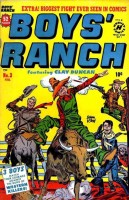 BOYS’ RANCH #3
BOYS’ RANCH #3
Writer: Uncredited
Penciler: Jack Kirby/Mort Meskin
Inker: Jack Kirby/Mort Meskin
Colorist: Uncredited
Letterer: Uncredited
Editor: Uncredited
Publisher: Harvey Comics
Cover Price: 10 Cents
Current Near-Mint Pricing: $500.00
Previously, in Boys Ranch: Having lost his family at a young age to bushwhackers, Clay Duncan has become the foreman of Boys’ Ranch, serving as de facto big brother/father figure to a number of orphaned boys. Among the residents of the Ranch are former Civil War veteran Dandy, the ladies man, as well good-natured hillbilly Wabash, who always has his banjo ready for an off-key but spirited tune. Boys’ Ranch also serves as home-base for Angel, a young gunfighter with a fiery temper and rather limited social skills. The boys originally met in defending the ranch from an attack, only for the dying owner to bequeath it to them as a place where homeless young’ns can live free. This proves difficult, what with the proximity of the lawless town of Four Massacres, the kind of place where nobody gets off free, as a wandering poet named Virgil finds when he runs afoul of outlaw Curly Yager…
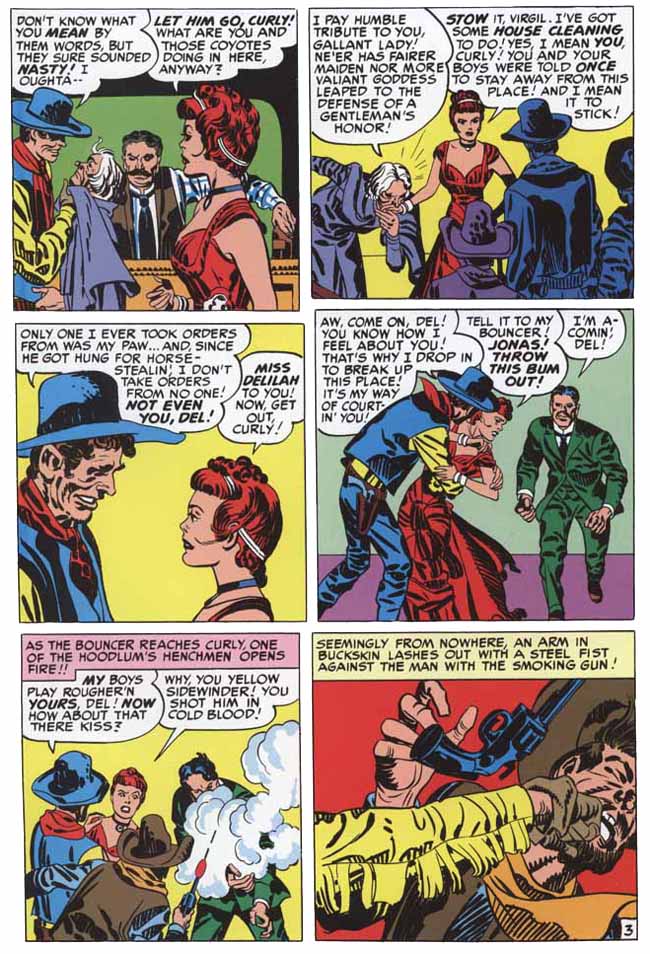 That buckskin-clad arm belongs to Clay Duncan himself, arriving just in time, with his teenage retinue in tow, and taking the starch out of Yager’s big talk. Never one to keep his opinions to himself, Angel tells Curly off in no uncertain terms, proving that he has the courage and conviction of a grown-up, even as he’s barely into his teens…
That buckskin-clad arm belongs to Clay Duncan himself, arriving just in time, with his teenage retinue in tow, and taking the starch out of Yager’s big talk. Never one to keep his opinions to himself, Angel tells Curly off in no uncertain terms, proving that he has the courage and conviction of a grown-up, even as he’s barely into his teens…
 Clay runs the desperadoes out of Delilah’s saloon, and she invites him to stay for dinner. Clay politely turns down her offer, citing the need to get haircuts for himself and the boys (save for Angel, who refuses to get his locks shorn) leaving Delilah to suffer the slings and arrows of her half-drunk patrons. With her humiliation fresh in her mind, Delilah decides that Clay’s young charges are the reason why he has turned down her favor…
Clay runs the desperadoes out of Delilah’s saloon, and she invites him to stay for dinner. Clay politely turns down her offer, citing the need to get haircuts for himself and the boys (save for Angel, who refuses to get his locks shorn) leaving Delilah to suffer the slings and arrows of her half-drunk patrons. With her humiliation fresh in her mind, Delilah decides that Clay’s young charges are the reason why he has turned down her favor…
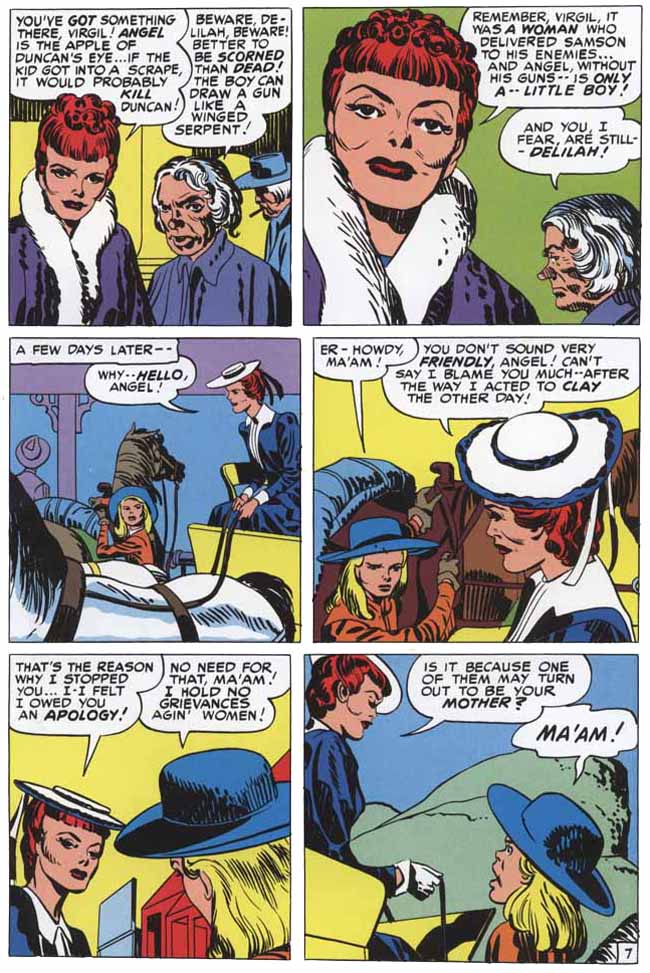 There’s a little bit of Lucille Ball in Kirby’s rendition of Delilah, and a touch of Marlena Dietrich as well, which is an odd pairing to be sure. Delilah’s selfish plan takes shape, as she offers Angel a meal, speaking of her loneliness after the loss of “a little boy forever lost to me,” playing the young sharpshooters emotions like a harp. Angel agrees, and soon is heading into town to spend time with Delilah every night, enjoying the attention of a surrogate mother. Delilah, for her part, seems to enjoy his company as well, but not enough to change her wicked plan for Angel…
There’s a little bit of Lucille Ball in Kirby’s rendition of Delilah, and a touch of Marlena Dietrich as well, which is an odd pairing to be sure. Delilah’s selfish plan takes shape, as she offers Angel a meal, speaking of her loneliness after the loss of “a little boy forever lost to me,” playing the young sharpshooters emotions like a harp. Angel agrees, and soon is heading into town to spend time with Delilah every night, enjoying the attention of a surrogate mother. Delilah, for her part, seems to enjoy his company as well, but not enough to change her wicked plan for Angel…
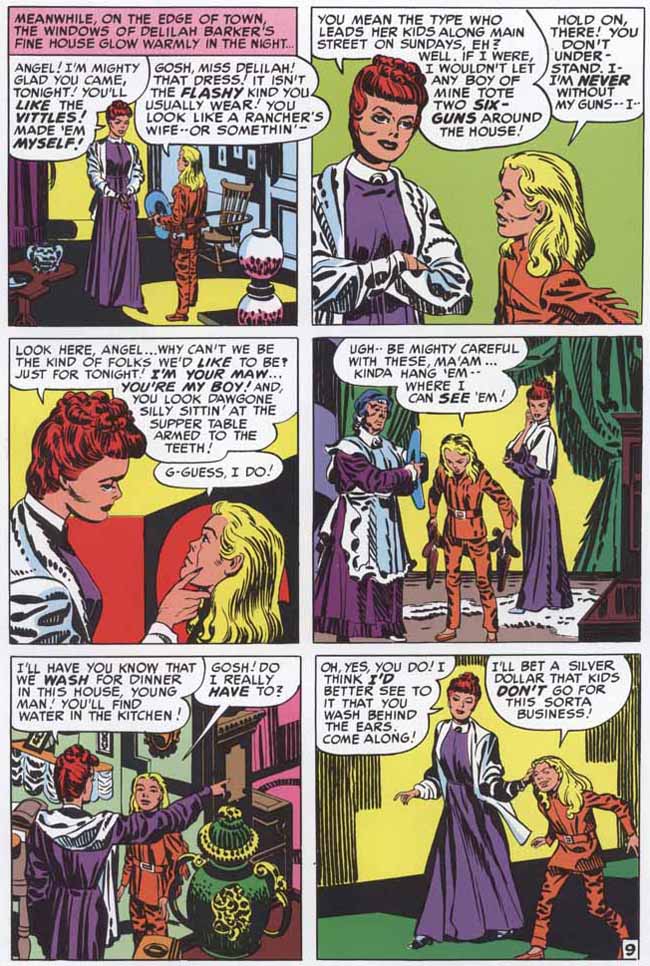
It’s kind of heart-breaking to watch their interactions, and Delilah washes the boy’s hair, gives him a little book-learnin’, and even sings him a few songs. Delilah calls him “son,” and Angel’s reaction is one of confused excitement, as he agrees that they will meet to walk down Main Street on Sunday, just like the other mothers and sons do. Of course, it’s all just an illusion, and one that Clay Duncan can’t abide by any longer…
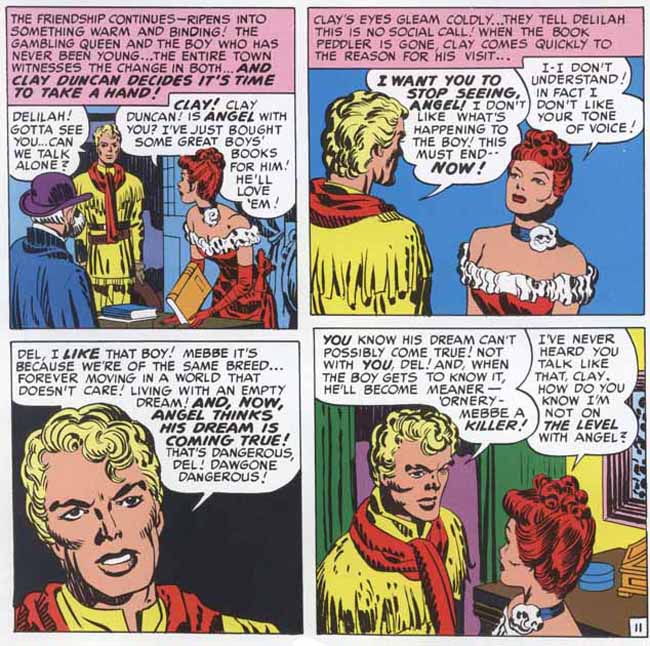
There are those who mock Kirby’s art, especially once he gets into his Marvel-era work, where every character becomes a muscular slab with squarish fingers. But, ten years before the Marvel Age, Kirby’s figure-work is more slender, his females more delicate, and Delilah especially shows the difference in this sequence…
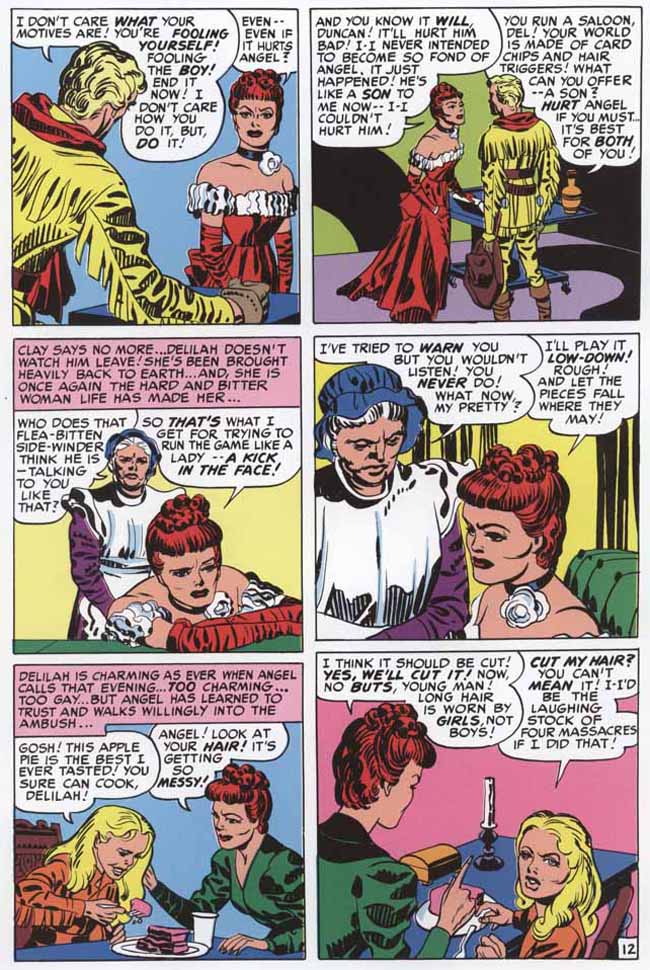
The weird thing about this story, for me, is that I can’t quite bring myself to dislike Delilah as much as I want to, as it seems that the saloon-girl is just as lonely as Angel himself, and for all her game-playing, seemed to enjoy being a mother-figure as much as Angel enjoyed being her surrogate son. Of course, Hell hath no fury like a woman scorned, and if that woman has a pair of scissors? It’s double-trouble, as poor Angel finds out…
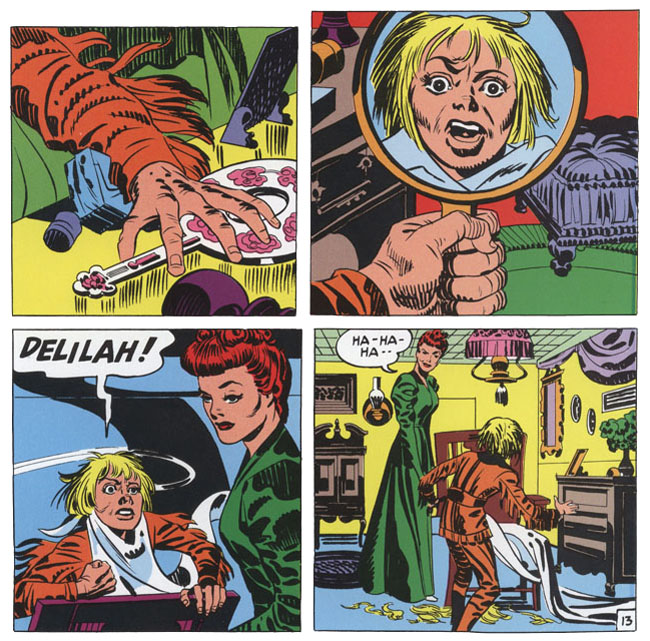
As his “mother” laughs at his foolishness, Angel runs into the streets, even forgetting his shooting irons, trying to escape his own embarrassment and humiliation, only to add insult to injury when he runs into Curly Yager and his gang of ruffians…
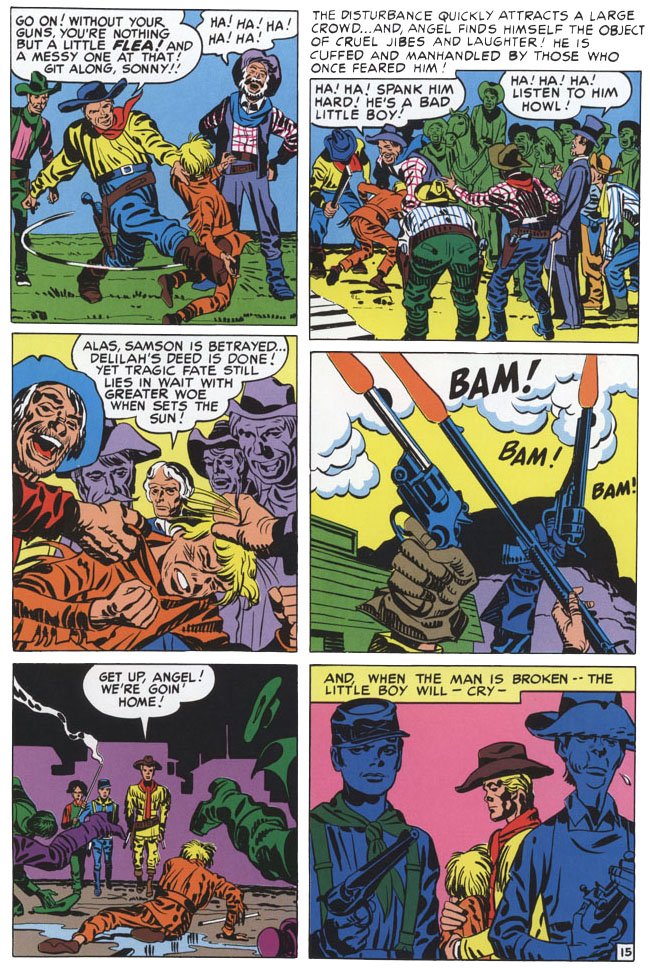
And once again, I get the sniffles, as Clay tries to calm his wounded “little brother.” The boys return to their ranch, but Angel seems to be a broken man, finding that his confidence and self-respect were cut away along with his hair. But, as the days go by, his locks start to grow in again, and when the Ranch is suddenly attacked by bushwhackers, Angel finds that he is once again able to shoot straight and raise hell…
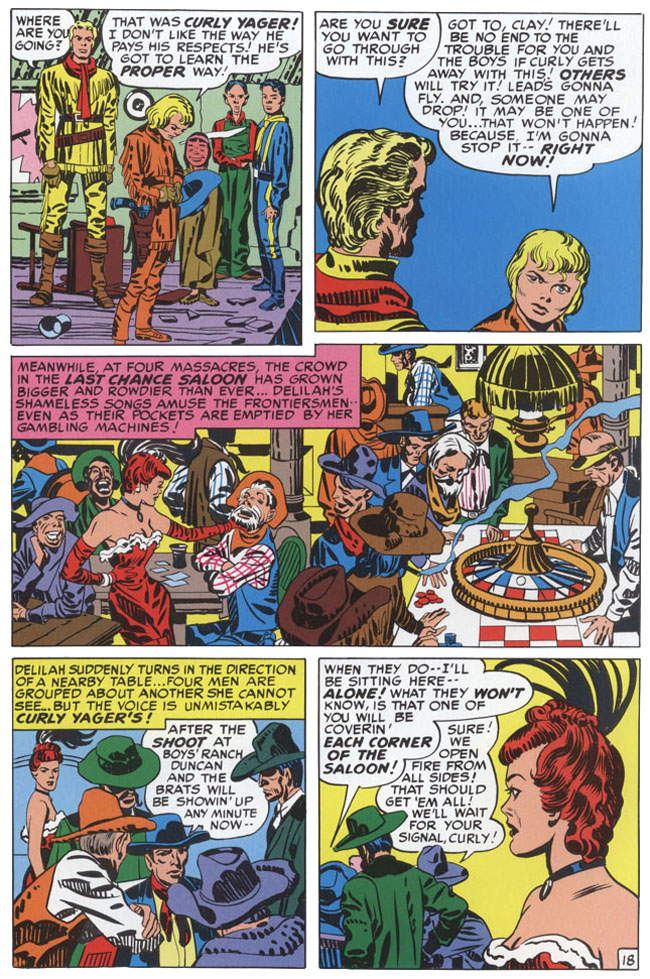 Without knowing that he’s walking into an ambush, Angel steps into the saloon to confront Curly, only to be greeted with the burning insult, “Does your mama know you’re out, little boy?” It’s hard to tell which half of the phrase is more inflammatory, but Angel’s response is classic non-verbal communication…
Without knowing that he’s walking into an ambush, Angel steps into the saloon to confront Curly, only to be greeted with the burning insult, “Does your mama know you’re out, little boy?” It’s hard to tell which half of the phrase is more inflammatory, but Angel’s response is classic non-verbal communication…
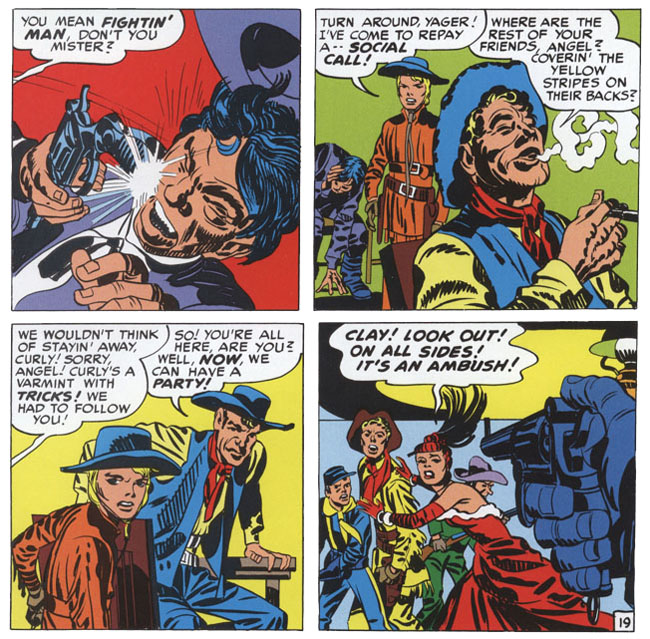
The real power in this story comes in the strength of the characterization. Delilah’s actions were selfish, putting her in the role of primary villain, but as the Yager gang opens fire, it is she who warns Clay of the ambush. And, when the smoke clears…
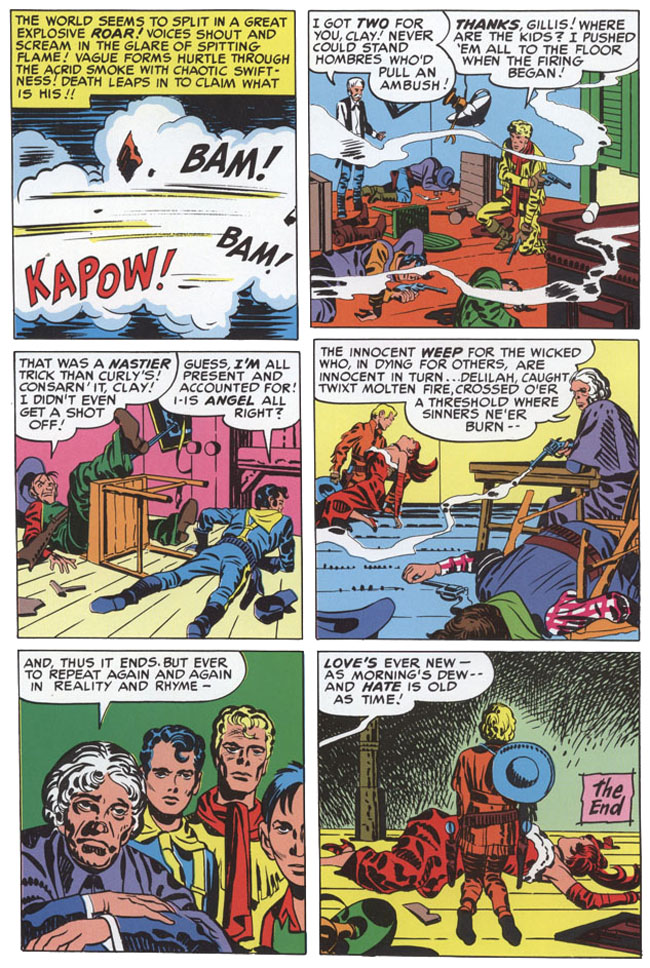
…Delilah is dead, the victim of Curly’s bullets, leaving only poet Virgil (who, you might notice, helped to fight off the Yager Gang) to deliver the eulogy in his role as Greek Chorus. It’s a strong start to a strong issue, one that also includes a focus on Dandy and his latest lady-love…
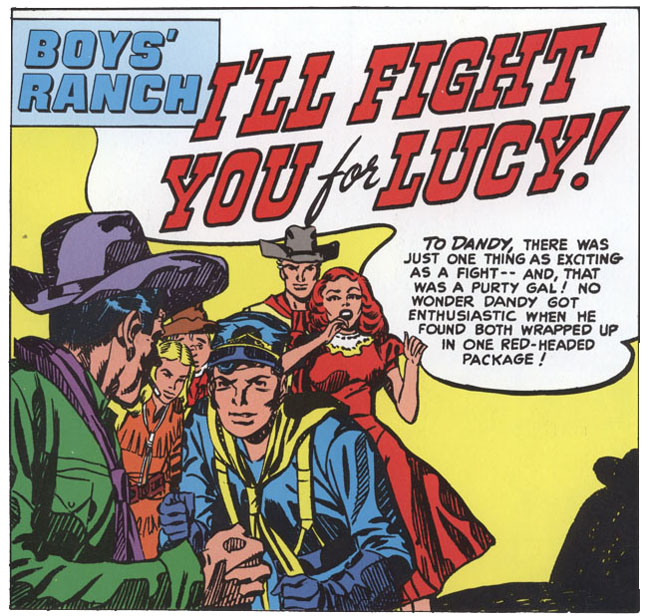
The boy has more paramours and worse romantic luck that Little Joe Cartwright, and that’s saying something. As for plucky comic relief Wabash, he shares the tall tale of his Grandpappy Fleezer, whose exploits rival those of Pecos Bill his own self…
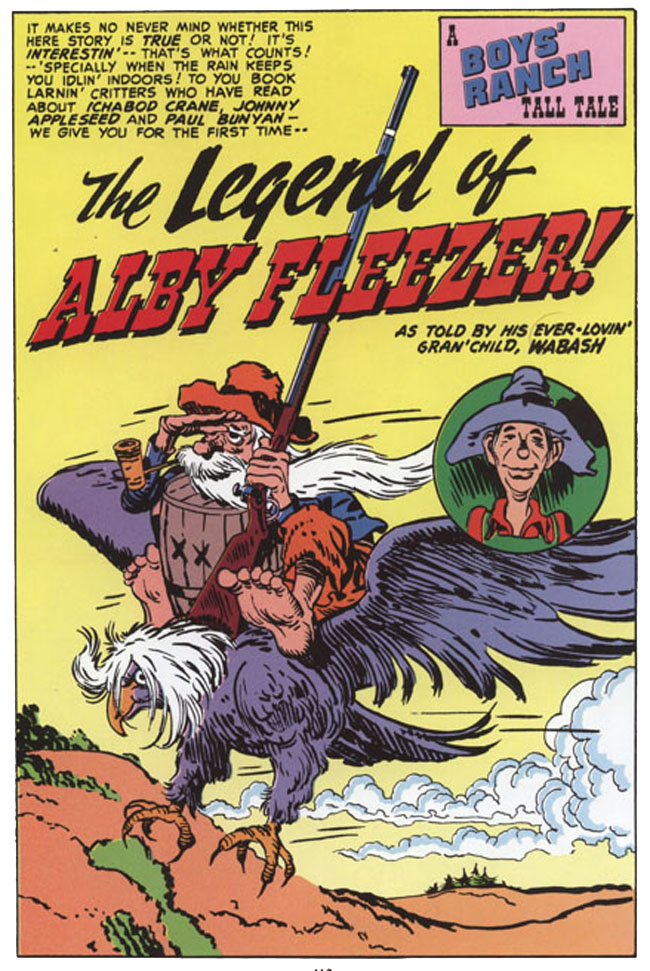
Much as Stephen did, I grew up surrounded by Westerns, but never really enjoying them (except for the Sci-Fi nonsense of the original ‘Wild, Wild West’ and bits and pieces of the Guy Williams ‘Zorro.’) But it’s clear from this legendary issue that the genre is nothing more than a stage for the story, and Angel’s touching story is an impressive bit of work by Kirby. (I have only fragmental information on the credits of this issues, due to its age, and am unable to find 100% confirmation whether longtime partner Joe Simon contributed to the story or not.) In any case, Boys’ Ranch #3 earns its place in history by waxing poetic and generating genuine emotion for me as a reader, earning 5 out of 5 stars overall. This is the kind of book that makes me very sad that superheroes have taken over the industry, as it’s a tale that only works as well as it does due to its western setting.
DID YOU READ THIS ISSUE? RATE IT!
Reader Rating
[ratings]



2 Comments
I am a great fan of Western movies, and I grew up reading every single thing that Zane Grey and Louis Lamour wrote (I even have a letter and Christmas Card that Louis Lamour sent me) but Western comic books have never worked for me. I think that the pages and the frames are too darned small to contain the heroic landscapes of the West and too small contain the larger than life characters which appear in Western stories. Add to that the fact that, back when Western comics were being produced, all the comic book publishers, and most of the artists, lived and worked in New York and had never been further west than Staten Island. They could no more write or draw a proper Western than I could write or draw a proper story about the Spanish Inquisition. Nevertheless, I enjoyed reading the above review, even though I am not particularly fond of Jack Kirby, and I laughed aloud when I saw that the red haired woman was modeled directly on Amanda Blake. If you don’t know who Amanda Blake was, I suggest you watch Gunsmoke.
This predates Gunsmoke on TV by half a decade… More likely both Delilah and Miss Kitty were based on the saloon girl character from “Destry Rides Again.”